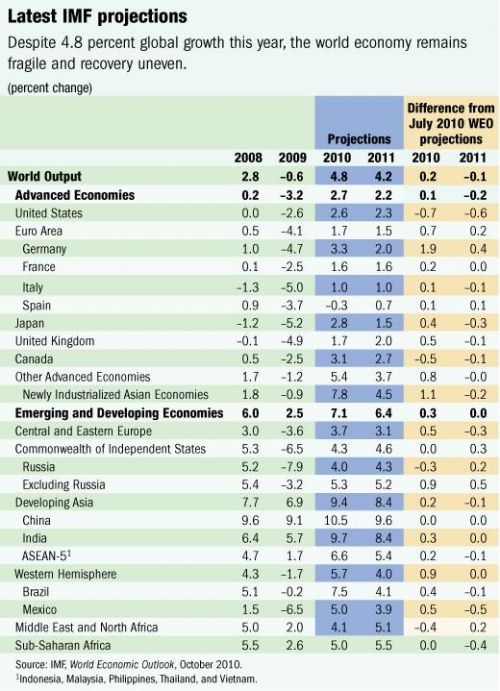
webmaster
© Copyright DEHAI-Eritrea OnLine, 1993-2010
All rights reserved
From: Berhane Habtemariam (Berhane.Habtemariam@gmx.de)
Date: Fri Dec 17 2010 - 17:32:14 EST
Global growth to slow says Economist Intelligence Unit; Eritrea to be 2011 growth leader
By Finfacts Team
Dec 17, 2010 - 2:35 AM
http://www.finfacts.ie/irishfinancenews/article_1021275.shtml
http://www.finfacts.ie/artman/uploads/3/Global-economy-IMF-Dec172010.jpg
<http://www.finfacts.ie/irishfinancenews/article_1020729.shtml> IMF's World Economic Outlook, Oct 2010.
2011: country by country, just published by the Economist Intelligence Unit, predicts that growth trends in the New Year will diverge between the rich and developing world. Global growth will slow as fiscal stimulus is withdrawn and emerging markets will continue, to a large extent, to shrug off the 2008-09 economic crisis. Eritrea, the former Italian colony, which won independence from Ethiopia in 1993 after a long bloody war, is set to become the world's top growth leader in 2011.
Meanwhile, the developed world will remain preoccupied with sluggish growth, high employment and rising debt burdens. Anjalika Bardalai, the Economist Intelligence Unit's Country Report Manager and the Editor of 2011: country by country, comments: "Balance will be a defining theme of the global economic landscape in 2011. Scores of governments will be preoccupied with trying to get the balance right between fiscal consolidation and economic growth. Meanwhile, many emerging markets will struggle to balance capital inflows, exchange-rate management and inflationary pressures."
Downside risks to economic stability also abound. These include:
‑ The possibility of a double-dip global recession
‑ The threat of sovereign defaults in several countries, notably in the euro zone
‑ Deflationary pressures in several key developed economies
‑ New asset bubbles in emerging markets
‑ A rise in social unrest, given slowing economic growth and fiscal austerity measures in many countries
2011: country by country, the well-established annual forecasting guide from the Economist Intelligence Unit, contains a concise assessment of the political and economic prospects for the year ahead for almost 200 countries, together with key economic indicators and a summary of forecast numbers.
<
Highlights in the 2011 edition include:
* World GDP growth (using market exchange-rate weights) will slow to 2.5%, compared with 3.5% in 2010...
* <http://topics.nytimes.com/top/news/international/countriesandterritories/eritrea/index.html> Eritrea will overtake Qatar as the world's fastest-growing economy, as production begins at the country's first operational goldmine.
* The world's worst-performing economies will be concentrated in western Europe, which accounts for 12 of the world's 20 slowest-growing economies in 2011.
* Eurozone interest rates will remain at a record-low 1%, but the European Central Bank could face growing pressure to implement unorthodox policy measures to boost growth.
* Chile will continue to stand out as the most stable and resilient economy in Latin America. Post-earthquake reconstruction will drive growth.
* Eleven out of the 20 fastest-growing economies will be in Sub-Saharan Africa, but growth in the region will continue to be driven by exploitation of natural resources.
* Although still strong, growth in China will be the slowest since 2001. Nonetheless, China will remain the world's fastest-growing major economy.
World growth league table, 2011a
(Real GDP growth, %)
20 fastest-growing countries
20 slowest-growing countries
Eritrea
17.0
Puerto Rico
-4.2
Qatar
15.8
Greece
-3.6
Ghana
14.0
Portugal
-1.2
Ethiopia
9.0
Ireland
-0.9
China
8.9
Venezuela
-0.1
India
8.6
Italy
0.5
Uzbekistan
7.9
Spain
0.5
Laos
7.7
Iceland
0.6
Haiti
7.5
Cyprus
0.8
Papua New Guinea
7.4
Belize
0.9
Angola
7.4
Jamaica
1.0
Botswana
7.4
Austria
1.0
Liberia
7.3
Belgium
1.0
Mozambique
7.3
Netherlands
1.0
Tanzania
7.1
Japan
1.2
São Tome and Príncipe
7.0
Tonga
1.2
Sri Lanka
6.9
France
1.2
Vietnam
6.9
United Kingdom
1.2
Rwanda
6.8
Brunei
1.4
Malawi
6.7
United States of America
1.4
a Economist Intelligence Unit forecasts.
2011: country by country is available from the Economist Intelligence Unit <http://www.store.eiu.com/product/990000299.html?ref=featuredProductHome> online store for £395; US$635. A single article costs $32.
Bruce Kasman, chief economist & head of global economic research at JPMorgan, sees broad-based global growth in 2011, but inflationary risks also exist. He tells CNBC's Karen Tso & Bernard Lo more:
Video- <http://www.finfacts.ie/irishfinancenews/article_1021275.shtml> http://www.finfacts.ie/irishfinancenews/article_1021275.shtml

----[This List to be used for Eritrea Related News Only]----
